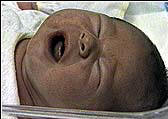![]()
`Totally unexpected' death of
baby probed
Five-week-old infant died after he was circumcised at Penticton hospital
THE PROVINCE, by Jason Proctor, Vancouver, British Columbia, Thursday, August 29, 2002
The Kamloops coroner is investigating the case of an infant who died last week from complications following his circumcision at Penticton Regional Hospital.
The five-week-old child was released after the procedure last Tuesday morning, but his parents went back to talk to the doctor later that day with concerns about bleeding. They returned home, but the situation worsened overnight, forcing them to rush the child back to hospital early Wednesday.
The infant was flown by air ambulance to Vancouver, where he died last Thursday in B.C. Children's Hospital.
"It certainly seems to be unusual," coroner Ian McKichan said yesterday. "It's definitely something that warrants an investigation, because it's a totally unexpected sort of death."
Deaths following circumcision are almost unheard of, but like any operation, bleeding and infection are the greatest dangers.
The case raises questions about an increasingly rare operation which stirs controversy in some circles.
"The bottom line is that circumcision is becoming a less-common procedure," said Dr. Morris Van Andel, registrar of the College of Physicians and Surgeons of B.C. "It's no longer an insured service -- it's considered an option. That makes it all the more distressing when you hear about something like this."
According to Penticton hospital officials, the operation to remove the foreskin from the child's penis was conducted by a physician with 16 years' practice in British Columbia.
The coroner's office is now awaiting the results of an autopsy being performed in Vancouver. McKichan said the investigation could take up to three months.
The college will likely also investigate the case after the coroner's inquiry is finished, to determine whether the death is the result of medical complications or malpractice.
Decades ago, nearly all Canadian boys were circumcised shortly after birth, but the Canadian Paediatric Society no longer recommends the procedure. It is now done mainly on religious grounds -- primarily by Jews and Muslims.
Because of the drop in popularity and increasing medical cost-cutting, children are usually circumcised at a doctor's office or as hospital out-patients.
Doctors generally observe a child for about an hour, and then instruct parents to watch for trouble.
"Instead of being observed by professional staff, the parents are left on their own," said Dr. Shelley Ross, a Burnaby family doctor. "If a person wants to get it done, should they be pushed into not having professional observation because of the cost?"
Doctors say the best time to perform a circumcision is in the first few weeks after birth.
The operation should take 10 to 15 minutes under a local anesthetic, performed with a clamp designed to seal the blood-vessels.
"The amount of blood you should see with this type of procedure, should be no more than a [bit] on the diaper," said Ross.
"You need experienced hands. You need to to know what you're doing."





